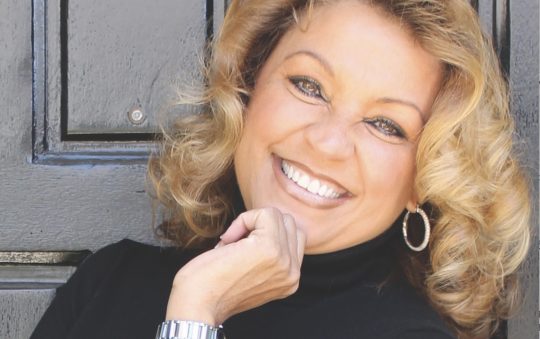
Rodney King, as an author (PHOTO: Malcolm Ali Sentinel Photos)
Though it was a case of unintended consequences, the effect that the televised beating had on the LAPD is unquestionable: the Christopher Commission, the federal consent decree and much more
“His legacy is very clear. He was like an accidental icon,” recalled civil rights attorney and activist Connie Rice, who recently met with notorious L.A. motorist Rodney King before his untimely death June 17.
“He said it himself.” He said, ‘I’m no hero but I have become a symbol and I want to try and live up to that symbol.'”
As documentaries, news reports and reflections marked the twentieth anniversary of the Los Angeles riots this past April, its centerpiece, the embattled King seemed to have finally made peace with himself. He had just published a book about his life, he was engaged to be married and he told reporters that he was no longer bitter about the brutal beating he suffered at the hands of Los Angeles police back in 1991. Now, his sudden drowning has caused surprise and puzzlement among those who knew him and had the opportunity to talk with him recently.
” I saw him three weeks ago and it’s just so sad because for the first time, I saw him happy, confident and like he knew what he was doing,” Rice said.
“I didn’t see the pain. I didn’t see the addictions anymore. It looked like he was really turning a corner so, this is just so sad…”
King, who grew up in Alta Dena, California gained notoriety as the star of the first “caught on tape” police brutality video in American History. On March 3, 1991, he, along with two passengers had been driving west on the 210 freeway when officers Tim and Melanie Singer attempted to pull him over for speeding. King refused because, as he later told reporters, he had been drinking and he was afraid to go back to jail on a parole violation.
A subsequent car chase ended with at least three LAPD officers beating King nearly to death in an attempt to, according to their own testimony, subdue him. Unbeknownst to the officers, local resident George Holliday had videotaped the entire incident, eventually submitting it to TV station KTLA. The video exploded onto television screens around the world, sparking outrage but not nearly as much outrage as the officers’ subsequent acquittal one year later.
In 1992 King had become, according to those close to him, a reluctant symbol of one of Generation X’s most significant civil rights issues. It was then that three days of deadly violence kicked off in South Central Los Angeles, where King made his now famous emotional plea: “Can’t we all get along?” Almost ominously, at an April 2012 book signing, he told reporters the phrase is what he hoped to be remembered for when he’s “dead and gone.”
“He stood up and he said, ‘Please don’t do this,'” said Rice, looking back at the South L.A. press conference 20 years ago.
“‘We’re hurting the old ladies. We’re hurting the little kids. Can’t we all get along.’
“I found that extremely moving because he could have poured fuel on the fire. Instead, he [tried] to help people who were suffering in the riot and asked us could we get along. That’s what he’s going to be remembered for now…”
He’ll also be remembered, Rice said, for the significant changes within Los Angeles, especially its police department, which before the riots, had been engaged in a long and violent battle with the city’s Black youth.
“The fact that his beating got televised, got recorded by George Holliday, got put on CNN… that began 20 years of catalytic change that we’re still going through today.” Rice said.
“His beating set into motion things that I don’t think would have happened had it not happened.”
Those things include the Christopher Commission, an independent oversight committee, dedicated to ensuring accountability within LAPD; a more conscious effort to forge better relations between the police and the community as well as a more significant effort among the diverse races in Los Angeles (Latino, Korean, African American, White, etc.) to at least understand cultural differences.
“Now, with that said,” Rice continued.
“I wish there was some other way we could have gotten there because he certainly didn’t deserve what he got. But the fact is that without that videotape I don’t think we would have seen the changes we saw.”
In acknowledging the role King played in changing the way LAPD did ‘business’ – especially as it relates to the Black and Brown communities – Chief Charlie Beck said, in statement to the media: “Rodney King has a unique spot in both the history of Los Angeles and the LAPD. What happened on that cool March night over two decades ago forever changed me and the organization I love. His legacy should not be the struggles and troubles of his personal life but the immensely positive change his existence wrought on this city and its police department.”
King was found dead at the bottom of the pool at his Rialto home, though close family and friends described him as an “avid swimmer.” There were no signs of foul play, said Rialto detectives and no outward signs of intoxication. Information about King’s official cause of death will be withheld at least six weeks while toxicology tests are completed.






